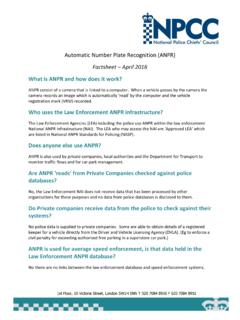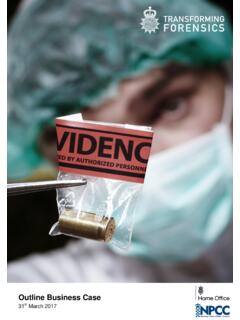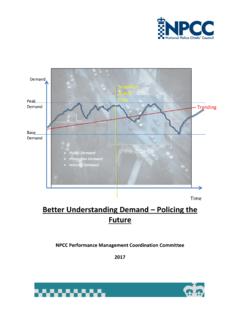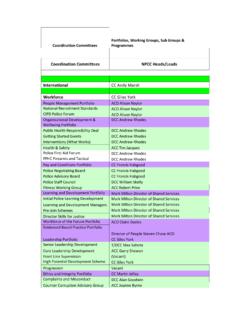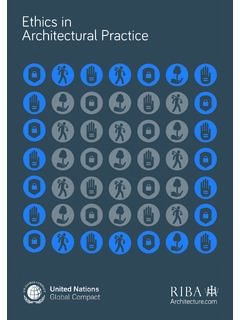Transcription of The National Police Chiefs Council (NPCC)
1 1. 3. 4. Foreword 6. NPCC Diversity, equality and Inclusion Pledge 7. The Diversity, equality and Inclusion Strategy Leadership Our Organisation Our Communities Our Partners 8. NPCC Diversity, equality and Inclusion Coordination Committee 12. Our Statutory Obligations 14. Scrutiny 14 5. Chief Constable Gareth Wilson Chair of the NPCC Diversity, equality and Inclusion Coordination Committee Policing by consent is the most fundamental that studied the treatment and outcomes for building block in the provision of policing Black, Asian and Minority Ethnic individuals services. This can only be achieved by within the Criminal Justice System, and the Race retaining legitimacy within the communities Disparity Audit, published in October 2017, which we serve through transparency, engagement evidenced race disparity across the public sector.
2 And an ethical and fair application of the law by a workforce that reflects the people it It is clear that sometimes the Police service serves. creates disparity but also that it has to deal with the consequences of disparity from other parts Policing has undergone a transformation over of the public sector. Policing must play its part to recent years responding to changes in demand, work with partners to reduce and ultimately seek rising public expectations, increasingly diverse to eliminate disparity wherever it lies. communities and alongside the impact of globalisation, technology and international The NPCC Diversity, equality and Inclusion (DEI). terrorism on the nature of crime.
3 We now have Committee utilised a grant from the Police a more diverse workforce across a variety of Transformation Fund (PTF) to develop a National roles and with a strong culture that focuses on strategic response and worked with The National outcomes. Policing is vitally important to all our Centre for Social Research (NatCen) to provide lives and it is central to protecting the rights and an evidence base to enable greater workforce freedoms that underpin our society. diversity and effective service delivery across communities. In response to the Home Affairs Select Committee Report on Diversity in Policing, This strategy gives clarity of leadership and action the Government restated its view that a that is required by the Police service across three diverse workforce representing people of all categories; our organisation, our communities backgrounds and groups goes right to the heart and our partners.
4 Of this country's historic principle of policing by consent. Not only does this ensure we can make embedding diversity, equality and inclusion much better use of the talents and skills of people into all that we do is an essential ingredient from all backgrounds, but also better understand for success and fundamental to this is an all communities enhancing our abilities to tackle effective co-ordination committee that crimes that affect them. influence our work within the NPCC and through into individual organisations. The An understanding of the context of policing as Diversity, equality and Inclusion Co-ordination part of the whole public system is essential and Committee will own, develop and deliver this has been examined by both The Lammy Review strategy on behalf of the NPCC.
5 6. As Chief Constables both individually 4. We aspire to be an employer of choice and as a collective, we recognise for people across our communities. the significant work that has been undertaken to embed diversity, equality 5. We will create an inclusive culture and inclusion into our workforce and where people feel confident to provide into the services we provide to our information about themselves. communities. However, we recognise there is still significantly more to be 6. We recognise the legal obligations we done and we do not underestimate the have as leaders and are committed to effort needed to truly embed it within ensuring these are met. all that we do. 7. We also recognise the moral basis for diversity, equality and inclusion and how 1.
6 We are committed to ensure we delivery of this strategy and associated better understand the composition of toolkits strengthens both the legitimacy of our communities and that having a truly policing and our operational outcomes. diverse workforce that reflects those communities not only has great benefits 8. We recognise the importance of having for the organisation but also for the public a strong evidence base for our decision we serve. making and will continually improve our approach based upon the research 2. We agree there is not a one size fits undertaken. all' approach to diversity, equality and 9. We agree that as a Police service we inclusion and the local response needs to sometimes create disparity but also be tailor made to ensure local needs are have to deal with the consequence of addressed.
7 A truly diverse workforce and disparity within other parts of the public service provision is one that reflects the sector system. We are committed to nine protected characteristics and goes understanding disparity within policing beyond to value difference. and to explaining that disparity. If we cannot, we will reform. Furthermore, we 3. We recognise and support the priority are committed to working with partners Government has given to tackling race to develop a whole system response disparity and commit to ensuring we that will help reduce and ultimately seek address those issues in line with that to eliminate disparity and create a truly agenda. diverse and inclusive service.
8 7. ies Ou it Un de un rst ies rP. it an un d mm art m in s tion om gt la Joi e nt rC. he dR. ners Our Co ou Par Se nce oo Tac ding rvi e tner dG. fid kl ce Engagement an n Understan ship La ing Deli Increasing Co Disp very LEADERSHIP. ndscape arity De c ve or e lo p kf in g o ur Wo r Tra ti ny n spa cru re n c y a n d S. Un der fo rc e sta n di ng o ur Work O ur t i o n O rg a nis a 8. The strategy has three key elements that enable success centred on the personal leadership of all Chief Constables and their chief officer teams. These elements are;. Our Organisation Our Communities Our Partners They provide a framework to accelerate progress on diversity, equality and inclusion, the delivery of positive equality outcomes and to ensure legal compliance.
9 In so doing, we will deliver a fair and responsive service that engages effectively with our staff, our partners and our communities and builds on our organisational values and culture. 9. Our Organisation Transparency & Scrutiny We will maximise the transparency of our Understanding our Workforce organisations to ensure our activities can be scrutinised to enable explanation or We will better understand the composition of our give evidence to enable reform. workforce by ensuring we put in place systems that enable the collection, collation and analysis of workforce data across the nine strands of diversity. Developing our Workforce We will put in place effective strategies that We will develop our staff to better enable formal and informal engagement with our understand diversity, equality , and staff and support networks to ensure we better inclusion and the positive outcomes that understand how we can continue to develop an will be delivered if we truly embed our inclusive organisational culture that promotes response within our organisations.
10 And embeds diversity and equality . We will create an inclusive culture where people, no matter their background, feel confident to disclose their characteristics. Workforce Toolkit The workforce tool kit sets out the key components to successfully achieving the vision of creating a representative workforce free from discrimination by focusing on specific actions within the following work streams: Leadership and Culture Progression Attraction/Recruitment Wellbeing and fulfilment Retention Exit from service with dignity 10. Our Communities Understanding our Communities Increasing Confidence We will better understand the composition We will deal effectively with all reported of our communities by ensuring we put in hate crimes and incidents, recognising that place systems that enable the collection, failure to do so has a detrimental impact on collation and analysis of community data the confidence those communities have in and information across the nine strands of the Police .



